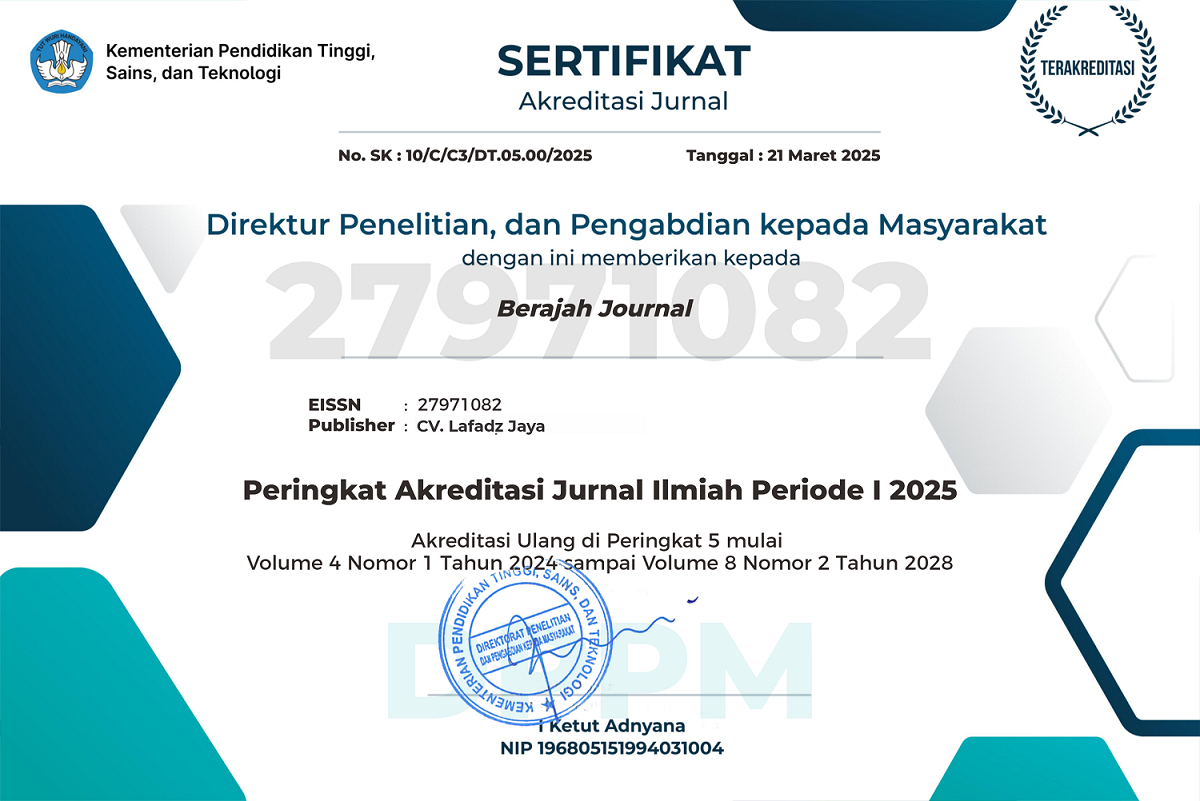EVOLUSI PERAN GURU DARI ERA KONVENSIONAL KE ERA TEKNOLOGI DALAM MENINGKATKAN KEMAJUAN PROSES PEMBELAJARAN
DOI:
https://doi.org/10.47353/bj.v4i11.516Keywords:
Evolution Of The Teacher's Role, Conventional Era, Technological Era, Learning ProcessAbstract
The role of teachers in the world of education has undergone significant changes along with the transition from the conventional era to the technological era. In a conventional context, teachers are considered the only source of knowledge, with learning methods that tend to be instructive and focused on teaching from teacher to student. However, technological developments have changed this role, making teachers facilitate, mediators, and innovators in the learning process. With technologies such as e-learning, interactive multimedia, artificial intelligence, and digital platforms, the effectiveness and flexibility of learning have increased, allowing for a more personal and collaborative approach. This transformation requires teachers to develop digital competencies, critical thinking skills, and the ability to adapt to technological advances and the needs of students. The role of teachers is now not only limited to delivering material, but also includes guidance, motivation, and the creation of an innovative and inclusive learning environment. Therefore, the ability of teachers to use technology is very important to improve the quality of education. In improving this progress, there must also be encouragement where in addition to themselves there are also from various parties, including the government and educational institutions, it is very necessary so that teachers can carry out their roles optimally in the digital era, in order to encourage the progress of a more effective and sustainable learning process.
Downloads
References
Abdurrahmansyah, A. (2017). Pendidikan Multikultural dalam Desain Kurikulum dan Pembelajaran Keagamaan Islam. Madania: Jurnal Kajian Keislaman, 21(1), 79-88
ANGGRAINI, F. (2022). PERAN GURU DALAM PENGADAPTASIAN PEMBELAJARAN TATAP MUKA DI ERA NEW NORMAL. Universitas Islam Negeri: Jurnal Ilmiah Mandala Education (JIME)
Angraini, T., Saragi, LN, Jannah, M., & Sopian, M. (2017, Desember). Perubahan Paradigma Peran Guru Dalam Pembelajaran Era Digital. Dalam Prosiding Seminar Nasional Program Pascasarjana Universitas Pgri Palembang .
Apriani, W., Syarifah, S., & Abdurrahmansyah, A. (2018). PENGARUH PENERAPAN MODEL PEMBELAJARAN TIPE TWO STAY TWO STRAY (TSTS) TERHADAP MOTIVASI BELAJAR SISWA KELAS VII PADA MATERI KLASIFIKASI MAKHLUK HIDUP. Bioilmi: Jurnal Pendidikan, 4(1), 1-4.
Arie Dwi Ningsih, & Angel Laura. (2024). Transformasi Peran Guru Sebagai Pilar Pendidikan dan Masyarakat Modern. Jurnal Pendidikan AURA (Anak Usia Raudhatul Atfhal), 5(2), 130–137. https://doi.org/10.37216/aura.v5i2.1833
Arifin, Z. (2013). Menjadi guru profesional (isu dan tantangan masa depan). Edutech, 13(1), 132-155.
Asmawi, A., Isnaini, M., & Febriyanti, F. (2025). Planning of Educational Facilities and Infrastructure Procurement at MTs Nurul Amal Pancasila Pemulutan. Tarbiyah Wa Ta'lim: Jurnal Penelitian Pendidikan dan Pembelajaran, 12(1), 107-115.
Baso, R. Z., Hamzah, R. A., & Tatroman, K. (2024). Curriculum Development Mechanism: An Analysis Adaptation of the Merdeka Curriculum in Elementary Schools. Madako Elementary School, 3(2), 199-215.
Dahiya, S. (2012). E-learning: A way to improve learning and teaching in education. International Journal of Academic Research in Business and Social Sciences, 2(3), 112-120.
Finaka, A., & Nurhanisah, Y. (2019). 4 Pilar Visi Indonesia 2045. Indonesia Baik.
Hamid, A. (2017). Guru profesional. Al-Falah: Jurnal Ilmiah Keislaman dan Kemasyarakatan, 17(2), 274-285.
Hasnida, S. S., Adrian, R., & Siagian, N. A. (2024). Tranformasi Pendidikan Di Era Digital. Jurnal Bintang Pendidikan Indonesia, 2(1), 110-116.
Lubis, M. (2020). Peran guru pada era pendidikan 4.0. EDUKA: Jurnal Pendidikan, Hukum, Dan Bisnis, 4(2), 0-5.odern: Tantangan dan Peluang di Era Digital. Karimah Tauhid, 3(12), 13388-13397.
Nursya’ban, M. S. (2024). Transformasi Pembelajaran dari Metode Konvensional ke Metode Modern: Tantangan dan Peluang di Era Digital. Karimah Tauhid, 3(12), 13388-13397.
Prayoga, F.I., Masruroh, N., & Safitri, N.V. (2024). Pentingnya Profesionalisme Guru dalam Meningkatkan Mutu Pendidikan Indonesia. Dalam Studi Sosial, Humaniora, dan Pendidikan (SHES): Seri Konferensi (Vol. 7, No. 3).
Rivo Dwiyano Putri, Sahrun Nisa & Ari Suriani. (2024). PENTINGNYA KOLABORASI ANTARA ORANG TUA DAN GURU DALAM MENINGKATKAN MINAT BELAJAR SISWA DI SEKOLAH DASAR. Jurnal Kajian Ilmiah Interdisiplinier.
Rodiyah, S. (2024). Strategi Pendidikan Moderasi Beragama: Peran Guru, Kepala Madrasah, dan Pengawas dalam Era Teknologi. Mitra Pilar: Jurnal Pendidikan, Inovasi, dan Terapan Jurnal Ilmiah Mandala Education (JIME)Teknologi, 3(1), 27-32.
Sadriani, A., Ahmad, M. R. S., & Arifin, I. (2023, July). Peran guru dalam perkembangan teknologi pendidikan di era digital. In Seminar Nasional Dies Natalis 62 (Vol. 1, pp. 32-37).
Simanjuntak, E., Saragih, S., & Napitupulu, E. (2025). A comparison of computational thinking skills: PBL model vs traditional learning. AXIOM: Jurnal Pendidikan dan Matematika, 14(1), 1-11.
Siringoringo, R. G., & Alfaridzi, M. Y. (2024). Pengaruh Integrasi Teknologi Pembelajaran terhadap Efektivitas dan Transformasi Paradigma Pendidikan Era Digital. Jurnal Yudistira: Publikasi Riset Ilmu Pendidikan Dan Bahasa, 2(3), 66-76.
Viana, D. W. (2024). Peranan Inovasi Pendidikan dalam Proses Pembelajaran di Era Teknologi Informasi. Universitas Lambung Mangkurat.
Wahyu Ningtyas, D. . (2024). PERAN GURU DALAM PENDIDIKAN MULTIKULTURAL UNTUK MEMBENTUK KARAKTER PESERTA DIDIK DI ERA SOCIETY 5.0. Jurnal MIPA Dan Pembelajarannya, 4(3), 3. https://doi.org/10.17977/um067v4i32024p3
Wati, I., & Kamila, I. (2019). Pentingnya guru professional dalam mendidik siswa milenial untuk menghadapi revolusi 4.0. In Prosiding Seminar Nasional Program Pascasarjana Universitas PGRI Palembang (Vol. 12, No. 01).
Downloads
Published
How to Cite
Issue
Section
License
Copyright (c) 2025 Ria Furmaisuri, Masnun Yulianda, Abdurrahmansyah, Rahmad Khadavi Alzafani

This work is licensed under a Creative Commons Attribution 4.0 International License.






















